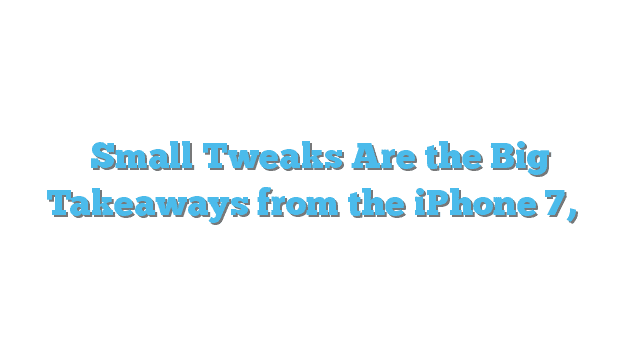Apple didn’t wow at its annual product event in San Francisco on Wednesday. No groundbreaking products, no last-minute surprises and nothing the rumor mill hadn’t already predicted. But what it did announce was enough to tide over investors and consumers, according to technology industry analysts.
The company has traditionally unveiled a new iPhone every September, and Wednesday was no different. The tech giant showed off the iPhone 7, its latest flagship smartphone. It also announced a new Apple Watch, named the Apple Watch Series 2; a new Apple Watch operating system called WatchOS 3; and wireless Bluetooth earphones called AirPods.
The new phones resemble the iPhone 6S and the iPhone 6S Plus, and will be available with 32GB, 128GB and 256GB of storage. The company has added two new colors to the iPhone line-up: a high-gloss jet black and a matte black. The iPhone 7 starts at $649; the Plus starts at $769. Both go on sale Sept. 16.
Though the iPhone 7 lacks major exterior changes — there’s no bigger screen and the device isn’t any thinner — analysts described it as a solid upgrade.
“Apple introduced some compelling features in this new phone, which should help spur upgrades,” said Daniel Ives, senior vice president of finance and corporate development at mobile tech company Synchronous Technologies. “[It] could turn the tide after the softness seen from the 6S cycle.”
For the latest phone, Apple has overhauled what’s under the hood, giving the iPhone 7 an A10 Fusion chip with a four-core processor, two of which are high performance cores and two of which are high-efficiency cores. The result is a phone that’s 40% faster than the iPhone 6S. Its graphics processor is 50% faster than its predecessor’s, and it boasts an additional two hours of battery life compared with the iPhone 6S.
There are big changes for photo enthusiasts, too. Both the iPhone 7 and 7 Plus have cameras with optical image stabilizers to reduce blur from shaky hands, a six-element f/1.8 aperture lens, and an overhauled flash featuring four LED lights. On the iPhone 7 Plus, two 12 megapixel cameras — one with a wide-angle lens, another with a telephoto lens — will offer users greater range, more artistic freedom and higher-quality photos in low light. The cameras will also allow for “bokeh,” that recognizable out-of-focus effect.
“The camera was the biggest upgrade, [and] I believe the new 7 Plus camera could be a true game changer as I can argue it now competes with entry DSLRS,” said Patrick Moorhead, an analyst at Moor Insights and Strategy.
Apple has made the phone dust and water resistant, and added a second speaker to the exterior. Now there’s one on the top and one on the bottom, making the phone twice as loud as its predecessor.
But to make space, Apple nixed the 3.5mm audio jack.
In announcing the elimination of the audio jack, Apple exec Phil Schiller said that the existing analog port was “ancient,” and that a compact digital device such as the iPhone couldn’t afford to waste real estate on it. The company will ship the iPhone 7 with a pair of wired earphones that plug into the iPhone’s proprietary lightning port, and an adapter that works with wired headphones.
The company’s ultimate goal, though, is to transition consumers to completely wireless earphones.
Cue AirPods, a pair of Bluetooth-enabled earphones that go on sale in October for $159. The AirPod ear pieces resemble Apple’s wired earbuds, and fit snugly into a dental floss-sized charging box. The Pods get five hours of play on a single charge, and the charging box holds as much as 25 hours of juice. They also come with a built-in W1 chip, sensors and microphone.
The AirPods will work with other Bluetooth-enabled devices, but will have to be paired manually.
Beats, the Apple-owned headphone maker, will also release its own line of wireless headphones and earphones with the W1 chip built in.
The Apple Watch also received an upgrade, with the company announcing a new model that is water resistant to 50 meters. The watch’s speaker, previously a place where water could enter and damage the watch, has been redesigned to eject water.
In addition to being faster and having a clearer and brighter display than the original Apple Watch, the Series 2 will also come with built-in GPS. That’s a boon for runners and cyclists who were skeptical of the first version of the Apple Watch, which offered limited fitness-tracking features when out of range of an iPhone. A new running model designed in collaboration with Nike shows how seriously Apple is courting the endurance sports market.
Also coming to the watch: Pokemon Go. The game is expected to launch on the watch before the end of the year with fitness-tracking features such as distance walked, but players will still need to pull out their phone to catch a Pokemon.
After dipping its toes into mobile gaming this year with Pokemon Go and Miitomo, Nintendo also made an appearance at Apple’s news conference Wednesday to announce that it was bringing a Super Mario game to iPhones, named “Super Mario Run.” The game will be available during the holidays. The news sent U.S.-traded shares in Nintendo up 28.8% to $36.32.
The Apple Watch Series 2 will go on sale next week starting at $369. The original Apple Watch will be discounted and starts at $269.
The iPhone 7 may not have been revolutionary, but analysts believe there’s enough to encourage existing customers to upgrade their phones and even convert some Android users, which might ultimately curb Apple’s declining sales. Analysts such as Ive predict that the upgrades introduced are laying the groundwork for future phones, too.
“[The iPhone 7] should set the stage for a more transformational release in 2017,” Ives said.
Apple shares rose 0.6% to $108.36.






